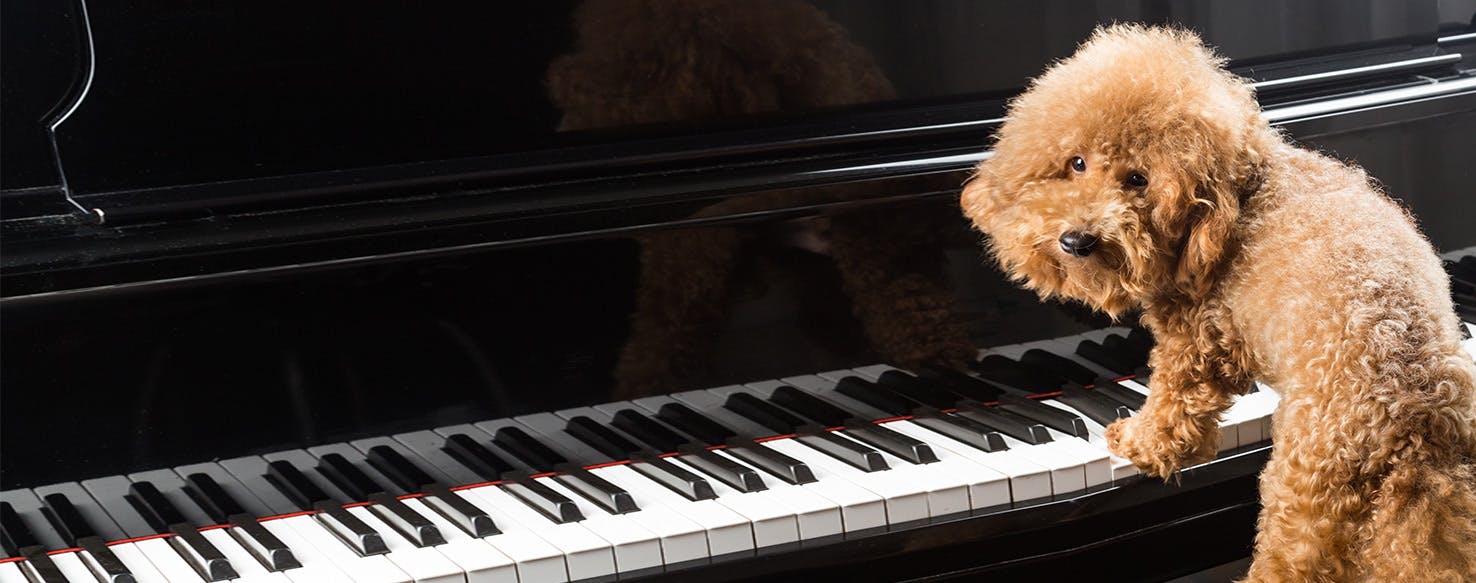- Home
- The Daily Wag!
- Behavior
- Why Do Dogs Play With the Piano

Unusual
Normal
You sit down at the piano to play and your dog jumps on the bench next to you. You start playing your favorite song and a few bars in, your dog plays a note. You smile and keep playing. Then he does it again. You pat him on the head and return your hands to the keys. Your dog’s need to be a musician is strong and you realize that you no longer are playing solo, but a duet. He even chimes in on vocals with a long bellowed howl. You thought there was only room for one Rockstar in this house: you. But your dog is trying to steal the spotlight and might prove otherwise.
Your dog’s aspirations to be a famous musician might be stronger than yours, but his motivation for it is not the same. You appreciate the melodies, structure, themes, rhythm, and emotions that music evokes. Your dog, on the other hand, does not appreciate music the way you do. He more or less makes noise that sounds beautiful to him. When your dog howls along while you strike each piano key, he is responding to his innate sense to communicate. Dogs howl as a form of communication, whether it is loneliness or chatting with the pack. As far as matching the pitch, the dog most likely intentionally avoids this. Recordings of wolves showed that each wolf in a choir chimes in at a different pitch so he can distinguish himself. Even if your dog is off pitch, he might think the notes played on the piano are part of a choir he can join in and he does not want to blend in. That’s why each dog’s howls are so different. When dogs are in a choir, the sound to humans is almost depressing and humans get a sense of loneliness or melancholy, but your dog probably likes it.
If your dog is striking the keys with you, he is probably mimicking your behavior. There are many amazing videos online of dogs playing the piano, sometimes even full songs, but often these are well-trained dogs. Like other tricks, they’ve learned this behavior through trial and error, with lots of treats and belly rubs. Dogs don’t enjoy music the way humans do, but they do enjoy some genres. There have been studies that prove dogs are calmer when listening to classical music and more agitated when listening to heavy metal. Pop music had little effect on the dogs studied. Similar things can be said about humans and music, as those genres have produced similar results in humans.
Need advice about your pet's health?
Get answers fast from a veterinary professional 24/7 in the Wag! App.
Get Vet ChatYour dog’s desire to rock out and perform live shouldn’t be a problem unless it bothers the neighbors or members in your household. Dogs howling is natural and your dog mimicking your behavior is nothing new and in this case, not harmful. If your neighbors are in close proximity and complain about late-night jam sessions, you might need to limit your practicing to daytime hours only. If your dog’s response to the piano keys starts a neighborhood choir of dogs howling, you might also want to reconsider how often you have your dog accompany you on vocals.
You can train your dog to play the piano and hit certain keys with his paws for a special song. This keeps his mind stimulated and entertained and you two have a bonding activity. Many animal owners do this and can show off their training skills when their dog/cat/horse does some human-like activity, like playing the piano. To train your dog, make sure you are ready with positive praise, be it belly rubs or pats on the head. If rewarding behavior with treats, make them smaller than usual, as this process might take some time and a lot of rewards. Keep the command simple and consistent. Guide your dog at first and reward him after and eventually, he will do it on his own.
If you can’t train your dog yourself, but you really want him to learn some fun tricks in the music world, take him to a trainer. The trainer can give you some techniques to improve how you train your pup. If your pup is playing the keys and howling when you’re not home, be sure to close the piano cover and push the bench in all the way. The neighbors might complain or be concerned because they know you’re not home, but someone is playing loud, off pitch music.
As your dog ages, he might experience health problems, like deafness. If he used to respond to music and vocal commands, but you think he might not be able to hear you anymore, take him to the vet. If he loses his howl or if it changes significantly, take him to the vet for that as well. Maybe he was howling a little too much, but it could also be something serious.
If you and your dog work together to become rockstars, you can both steal the show at your next party by playing some Beethoven or just some rock n roll. Training a four-legged musician can be fun and will let your dog express his musical self. The bonding experience is invaluable and entertaining.
Written by a Miniature Yorkie lover Stephanie Molkentin
Veterinary reviewed by:
Published: 03/09/2018, edited: 01/30/2020
More articles by Stephanie Molkentin

